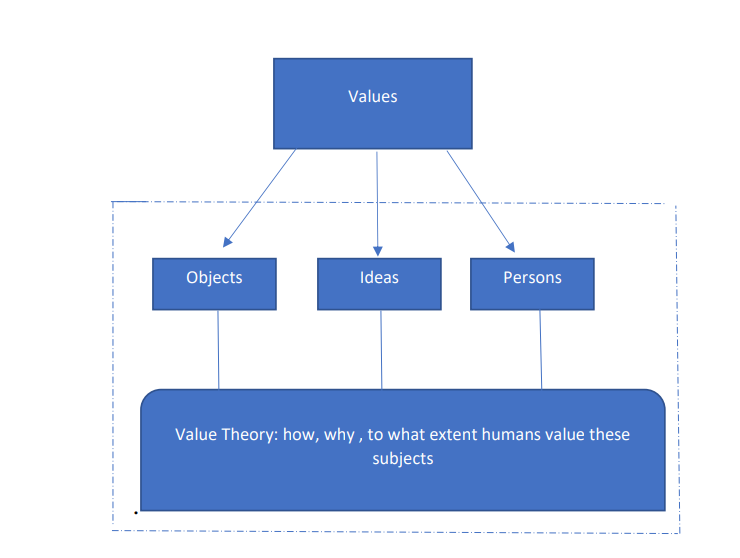ValueTheory
Acronym
N/A
Alternate name(s)
N/A
Main dependent construct(s)/factor(s)
Intrinsic values, Axiology of physical objects / psychological states
Main independent construct(s)/factor(s)
Attitude (to what extent an object is good or bad)
Concise description of theory
Value Theory holds that individuals judge and attach different values to a particular object based on its capability of satisfying a given need. It involves the degree to which humans value a particular thing or an object and accordingly posit importance on the same (“Value theory,” 2022). Individuals attach different ‘values’ based on ‘private’ and not ‘public’ scales. As such, for the same item, two individuals need not agree on the same value at the same instant of time (Harper, 1979). In Information Systems, Value Theory finds application in usability of a system and accepting a system usage based on valuing its importance. For example, individuals pose different importance to systems characteristics such as reliability, speed or efficiency (Phang et al. , 2009). Value theory also finds application in e-learning and online community platforms as it affects an individual’s intention to utilize user generated data ( Ray et al , 2021). In broader application, Information System personnel also attach different values to an organization and accordingly has an effect on their professional career changes ( Chang et al ., 2011).
Diagram/schematic of theory
Originating author(s)
Adam Smith ( 18th century , in economics sense)
Seminal articles
Harper, F. A., (1979),The Writings of F. A. Harper Volume 2: Shorter Essays,' An Introduction to Value Theory', California : Institute for Humane Studies, Inc
Originating area
moral philosophy, social and political philosophy, aesthetics, economics
Level of analysis
Individual
Links to WWW sites describing theory
https://en.wikipedia.org/w/index.php?title=Value_theory&oldid=1068294539, Wikipedia entry on value theory
Links from this theory to other theories
Expectancy Value Theory (Vroom, 1964)
IS articles that use the theory
Phang, C.W., Kankanhalli, A., and Sabherwal, R., (2009) , Usability and Sociability in Online Communities: A Comparative Study of Knowledge Seeking and Contribution, Journal of the Association for Information Systems Vol. 10 Issue 10 pp. 721-747 October 2009.
Ray, A., Bala, P.K., & Dwivedi, Y.K. (2021) Exploring values affecting e-Learning adoption from the user-generated-content: A consumption-value-theory perspective, Journal of Strategic Marketing, 29:5, 430-452, DOI: 10.1080/0965254X.2020.1749875
Chang, C.L., Chen, V.,Klein, G., & Jiang, J.J (2011) Information system personnel career anchor changes leading to career changes, European Journal of Information Systems, 20:1, 103-117, DOI: 10.1057/ejis.2010.54
Levy, Y., (2008) “ An empirical development of critical value factors (CVF) of online learning activities: An application of activity theory and cognitive value theory,” Computers & Education, Volume 51, Issue 4,2008, Pages 1664-1675,ISSN 0360-1315, https://doi.org/10.1016/j.compedu.2008.04.003.
References
Value Theory. (2022, Jan 27). In Wikipedia. https://en.wikipedia.org/w/index.php?title=Value_theory&oldid=1068294539
The Writings of F. A. Harper Volume 2: Shorter Essays, (1979), INSTITUTE FOR HUMANE STUDIES, INC,.
Phang, C.W., Kankanhalli, A., & Sabherwal, R. (2009). Usability and Sociability in Online Communities: A Comparative Study of Knowledge Seeking and Contribution, Journal of the Association for Information Systems Vol. 10 Issue 10 pp. 721-747 .
Ray, A., Bala P.K. & Dwivedi Y.K. (2021) Exploring values affecting e-Learning adoption from the user-generated-content: A consumption-value-theory perspective, Journal of Strategic Marketing, 29:5, 430-452, DOI 10.1080/0965254X.2020.1749875
Chang, C.L., Chen, V., Klein, G. & Jiang, J.J. (2011) Information system personnel career anchor changes leading to career changes, European Journal of Information Systems, 20:1, 103-117, DOI: 10.1057/ejis.2010.54
Contributor(s)
Arkomita Mukherjee, Doctoral Student at Indian Institute of Management, Kozhikode, India
Date last updated
21/08/2022 Please feel free to make modifications to this site. In order to do so, you must register.
